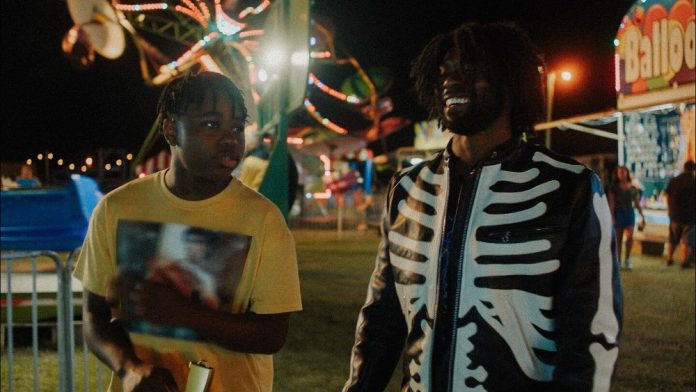Bruiser, the feature directorial debut of Miles Warren, may not be the kind of movie that people find right away, but it’ll surely be one that they’ll discover over time as Warren and his cast go on to bigger things.
Now streaming on Hulu, the film stars Jalyn Hall (Till) as 14-year-old Darious, who is being mercilessly bullied until he meets a reclusive loner named Porter (Trevante Rhodes), who lives on a houseboat and teaches the teen to fight back. That doesn’t go over so well with Darious’ mother (Shinelle Azoroh) and stepfather Malcolm (Shamier Anderson), who has raised the boy since he was young. Both of them know Porter from their past, and neither of them trusts him — especially around their impressionable son.
Bruiser offers a powerful portrait of what it means to be a man and more specifically, a father, and it’s another feather in Hall’s cap, as the young actor has a very bright future ahead of him. Rhodes, who earned a producing credit for his efforts on the film, crafts an effective portrait of a man fresh out of prison who years for connection and finds one with this young man. Warren does a great job with what some may view as difficult subject matter for even a far more experienced filmmaker.
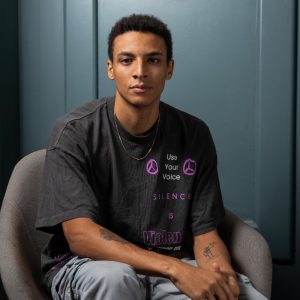
Above the Line spoke with Warren and Rhodes in person a few weeks back, and while there were plenty of laughs, the conversation also got pretty deep and surprisingly personal, with both men talking about their own fathers.
Above the Line: How did Bruiser come about? I know there was a short film, but I don’t know much else.
Miles Warren: It started when I was in college. A friend of mine, Ben Medina, we started writing a movie that I had pitched to him. So, it started as a feature script, and when I graduated in 2019, I decided I was going to direct it. We just basically distilled the feature into its themes and the specific visual style, and I directed a short that played at Sundance and South by Southwest and did well, and then I was able to use that to get the feature made.
ATL: What part of the feature was in the short? Was there a specific section?
Warren: It wasn’t anything specific. It’s actually kind of different, and I think that’s helped in a way. It’s about the same thing. There’s no Porter character, really. It’s just a father and a son, and the father gets into a fight in a bowling alley, basically, and the son has to deal with having seen that. It was very simple. Other than the altercation, the only thing that was also in the feature, the short ends with the weight bar landing on the kid’s neck, that scene.
ATL: Trevante, had you seen the short before Miles came to you with the script for the feature? What got you interested in playing Porter?
Trevante Rhodes: Of course. So, the piece was brought to me a couple years ago, and that’s when I went to see the short. But after seeing the short, man, the nucleus of what he was trying to convey was just insane.
ATL: And you came on as a producer, too.
Rhodes: I did.
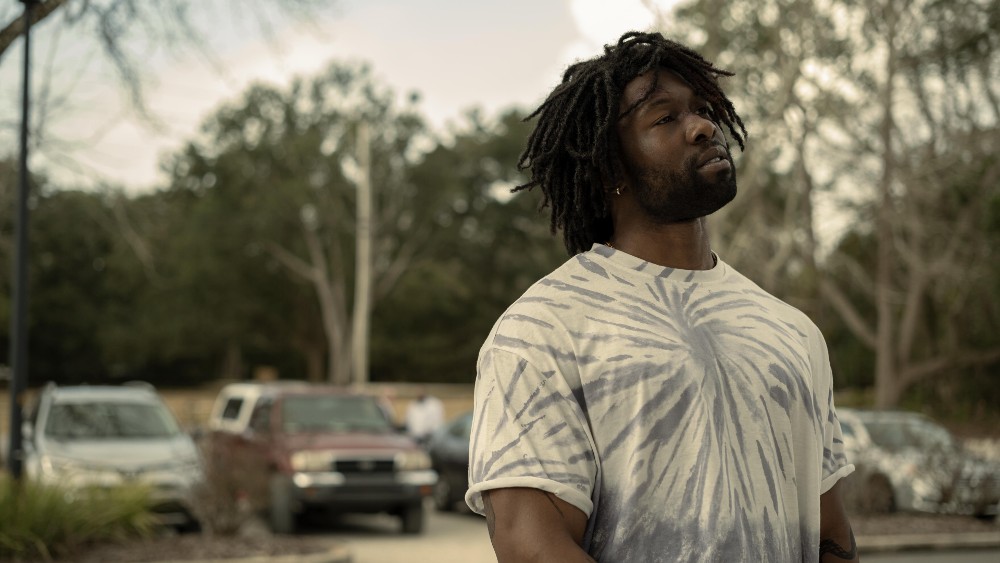
ATL: Did you sign on early because you had ideas that made you want to get more involved in getting the movie made?
Rhodes: No, it was just part of my negotiating point. [laughs] But also, for me, at this stage of my career, it was really an opportunity to champion someone who, I felt, is the next [big] thing, and then utilizing whatever awareness I have within the industry and with people, to do that, and [also,] have it be something that I could also dedicate to my son. It was just an all-encompassing, holistic thing to me.
ATL: I went into this not knowing anything about the movie. I had seen Jalyn in Till and Armageddon Time, so I was already a fan of his. He was great in this, too. He’s just this amazing young actor who can seemingly do anything.
Warren: And he’s on a rocket ship, man. Trevante was on first. Honestly, Jalyn was one of the last people to be cast, just because I couldn’t find someone that had the energy and the kind of talent to take on this role. We had so few days to shoot and so much to do, and the whole movie rests on his shoulders. I met him, and it was obvious. I think he was just about to shoot the Emmett Till movie, and I think what sold me was how intelligent he was about that role. I didn’t know anything about him. I think I freaked him out a little, because [I said], ‘There’s a lot you have to contend with. How do you do that?’ He was just very smart, and he was very much like, ‘I know how important this role is, and I know that I have to do a good job by it. I’ve been doing a lot of work.’ I realized that he’s a very emotionally intelligent person, and then, we just read some lines and did some work, and immediately, he was great. So I was like, ‘Yes, this is my guy.’
ATL: Trevante, since you were already attached, were you able to be involved in any chemistry reads with Jalyn or anything like that?
Rhodes: Nah, I was just rockin’ it like Porter, man. We just there, we just ride the wave.
Warren: It was one of those things where, when the actors all got there, I wanted it to be fresh. Darious meets Porter almost like this alien that just kind of shows up, and I wanted it to feel like that, in a way — the awe of this person — and not have any familiarity between them, and let them build that chemistry as we go.
We scheduled the movie so that the first scene that they have together is when they meet for the first time, so that stuff was important. The bigger scenes came a little later as that relationship built, so I could maintain the freshness of the encounter, and then slowly build into the intimacy that they [achieve].
ATL: Let’s talk about that first meeting on set in front of the camera. What was that like meeting this kid who is super smart?
Rhodes: It was cold and windy, and all the days when I had my clothes on, it was warm. Legitimate. Yeah, man, just working with Jalyn, he was cool. He’s somebody who understands what he has to do. Just as a young man, he understands responsibility, because of his situation, so he’s been someone who has had a lot of responsibility since a very young age. I think that’s something that we see, which is the reason why he is as good as he is, as devoted as he is. It was just a situation like that. [He’s] someone who I saw myself in. We jumped into space, and it was a fun time to play.
ATL: You mentioned you’re a father, so you must see how much smarter kids today seem to be from when we were kids.
Rhodes: Speak for yourself. I was a genius. I was a child prodigy. [laughs] Jalyn is someone who I relate to, in a lot of ways, because of that. It’s more because of his responsibilities, as well as his emotional intelligence, as Miles was saying. He’s just someone who has a really good understanding of people and the world because he has to, and that’s what it is.
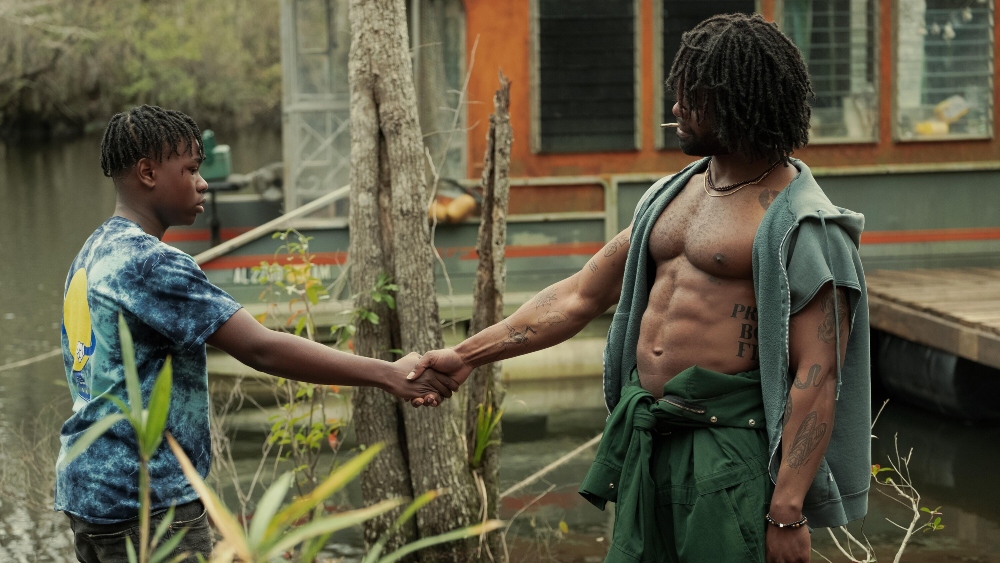
ATL: Where did you end up shooting Bruiser?
Warren: We shot it in Fairhope, Alabama; Daphne, Alabama; and one scene in Mobile, Alabama, but mostly in lower Alabama.
ATL: How did you end up down there? Was there a particular reason?
Rhodes: My father was actually born in Mobile, Alabama, so we made it about the father thing since it’s a story about fathers and fatherhood.
ATL: Were you able to give everyone tips on different places to eat and go to while there?
Rhodes: Nah, you know, I actually don’t have a father. I don’t talk to my dad. The last time we talked, I slapped him in [the] face. I didn’t want to say that, because I didn’t want to give him that, but emotionally, I felt that. I don’t really go out there, so no, I didn’t give them any [tips].
ATL: When I first saw this, I’m not even sure I knew you were Porter even though I’ve seen you in stuff, and when he first showed up, I assumed he was going to be angry and violent, because he’s this big guy who’s just out of prison, but he’s not like that, he’s far more sensitive. Did you bring a lot of yourself to Porter in some ways?
Rhodes: Always. As a performer, I really like to try and portray and do roles that are me, really, because I don’t really like to give too much of myself to people. I don’t like doing all this stuff. Putting in the work is really the best way, I feel, to give people an understanding of who I am as an individual. Always having the opportunity to do stuff like this is what I’m going after. So yeah, everything about Porter is me. That’s just one of my colors.
ATL: You already had this screenplay for a feature, so when you start bringing in actors like Trevante and Shamier, do you sit down with them and work with them on their characters? Was that possible?
Warren: It depends on what the process is. I think I’m too new of a director to be like, “This is how I do it; actors acclimate.” I ask each one of them how they like to work, and then I conform to that. Ultimately, they’re the ones on screen and putting their soul out there.
What I like to do really is, I don’t love rehearsal. [Maybe] if I’m doing something very technically intense, like complex blocking rehearsals, but we had a pretty condensed and intense schedule, and we still didn’t really do that many rehearsals. I like to tell the actors why I wrote this character [and] show them some things that remind me of the character [and] inspired me.
Trevante, I showed Terrence Malick‘s Badlands to look at Martin Sheen‘s character — the physicality and kind of swagger that guy has. I showed Shamier Punch-Drunk Love to look at [Adam] Sandler and the chaos [around him] and trying to control it all. And then I showed Jalyn this wonderful indie from 2017 called Dayveon, about a young boy whose brother gets killed, and the boy gets jumped into a gang, basically. It’s about this kid with all this violence around him trying to figure out who he is. It was a good piece to show Jalyn, just to get him into the mindset of what this movie is going to be. It’s going to be all about him, and it’s about the looks he gives and how he processes violence. And he got it — he appreciated it.
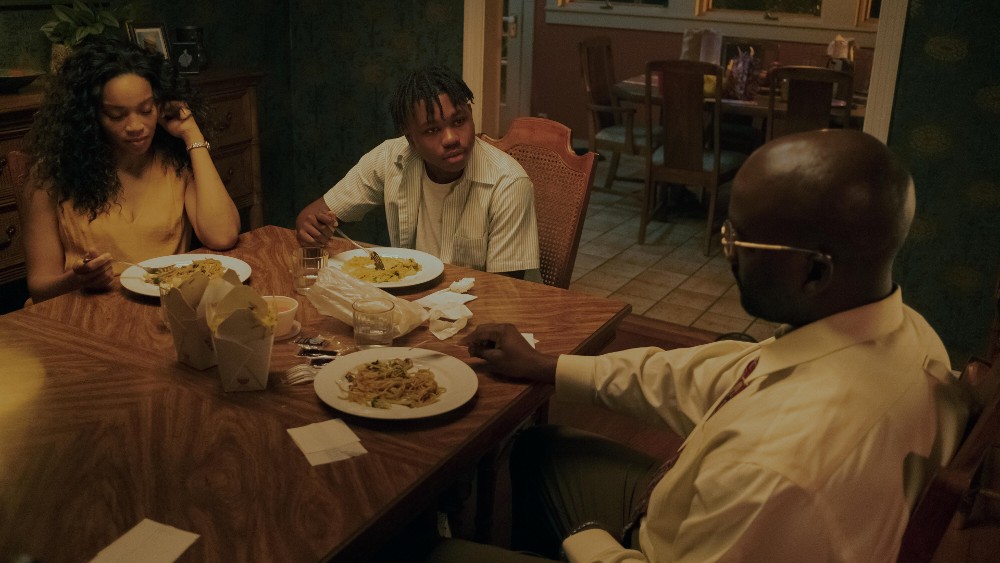
ATL: I want to talk about Shamier’s performance as Malcolm, and I’m going to you for that one, Trevante, since you have some really intense scenes with him. As actors, do you talk about that stuff beforehand, or do you just do the scene and see where it goes in order to, as Miles put it, keep things fresh?
Rhodes: Always. As performers, [for] me personally, I just like to be present and be a person. I never really like to do too much rehearsal if I don’t have to. Sometimes, people need it, for blocking or whatever it may be, but it kind of dilutes the experience for me. Shamier was someone who — at least within the space — was the same way. We saw each other in the gym out there once, and it was like one of those, “I’m in the gym, I don’t want to [talk to you].”
Warren: Like before the shoot? Oh, no! Was there a little stare-down?
Rhodes: It was just one of those situations where it was like that, but it was a situation where it was like, “I see you, but I’m gonna whoop your ass if I pay attention.” It was this unique energy that replicated the piece, but it was a unique energy that was so reflective.
Warren: I also tried to separate them, and said, ‘Don’t talk.’ I think we had to do [some] blocking for the final fight, and I could already feel the tension just before the shoot, and it was great. I loved that move.
Rhodes: And he’s such a sweet guy. It was beautiful.
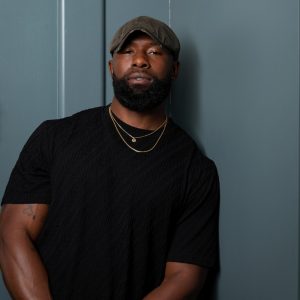
ATL: Was that your real hair or was that a wig?
Rhodes: Thank you for asking, man. Fooled one person. Good.
ATL: It may have been one of the reasons I didn’t recognize you. It was also a nice touch to have Malcolm with his shaved head, but then have Darious and Porter have similar dreads. I’m not sure how many people will catch that connection.
Warren: No, it was important to me. Doing wigs [is] definitely tough on small budgets, but honestly, I would do nothing differently, because the power of the hair and the similarities between Darious and Porter, and just how quick that connection would be, is so powerful. It’s like a very obvious, striking symbol. I did a screening at my college and my old professor who did the Q&A loved that. [He said], ‘It’s brilliant, and it brings you in so quickly.’ And I’m like, ‘Thank you. Thank you.’ So, I’m a Porter’s hair defender.
ATL: I want to talk about the title of Bruiser, because it does get more apparent as it goes along, but what did it mean to you? Was that a title you had very early on for the feature?
Warren: It took us a while to get, honestly. It was Untitled for so long. I’m terrible with naming art. It’s normalized, because it exists, but when you think about it, you just have to come up with a concise word for this incredibly expensive, emotional piece. Bruiser just seemed like the most concise. It’s literally about an aggressive figure. It’s an old-school, less-used word. I think British people use “bruiser” a lot, or more in southern America. It’s just a very concise idea for, at the core, what these two men come from, or the life that they’ve lived in the past, this term they’re trying to shed, the idea of “this person is a bruiser.” I think it was an apt title for what these two men are desperately trying to lock away and hide behind them.
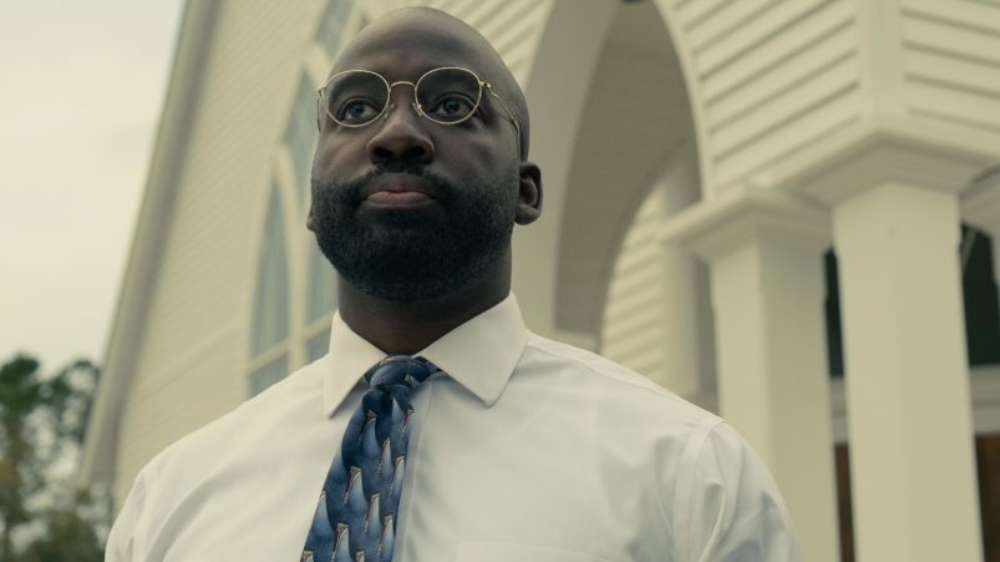
ATL: One thing I love about Porter, and also your character in Moonlight, is that both of them are redemption stories, in that they get out of prison and reacclimate to society normal, even though Porter has issues later in the movie. I’m curious if you’d ever —
Rhodes: Been to prison?
ATL: No, I wasn’t going to go that far. That’s your own business, but I was curious if you know anyone who’d been to prison and emerged a new man who you could call upon for reference in creating those characters?
Rhodes: My brother’s in prison right now.
ATL: Oh, wow, is that redemption element something you see in these roles that gets you interested in showing another side of these characters?
Rhodes: I mean, this is what I know. I like to tell stories that are reflective of my journey [and] my experience. A lot of times, people have a hard time pitching the characters that I have the opportunity to play because they don’t really understand that feeling. So I love being the slime.
ATL: I think because people see you as a big guy, they think of you as playing soldiers and those types of roles.
Rhodes: That stuff is boring, but that’s because people don’t understand. People are getting better at understanding [the] depths of people’s emotions. People are just getting better at understanding people now, I think, because people are getting smarter, I guess.
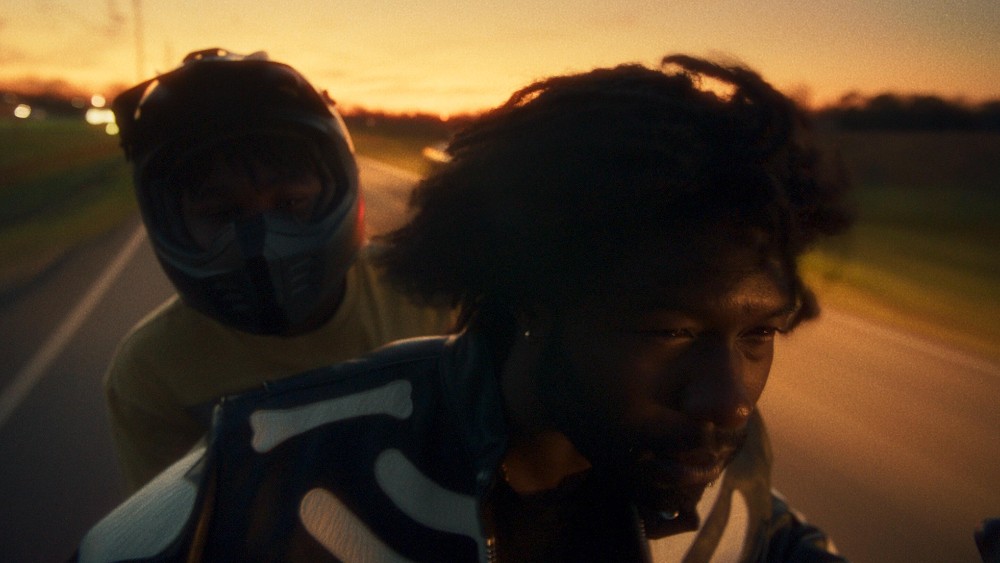
ATL: I do want to ask about the technical aspects of some of the scenes, particularly the scene on the motorcycle and the one on the Ferris wheel, since those both feature great cinematography. Was that just a camera mounted on a motorcycle?
Warren: Why thank you. Yeah, for the motorcycle stuff, we put the bike on a process trailer, and then we put a 14mm lens right up close into the wide-angle Fallen Angels-inspired shot. I think we shot that in 16 frames [per second], so that’s what gives it that ethereal sped-up look that adds to the motion, which I really loved. So yeah, it’s just a process trailer and camera on sticks. The Ferris wheel was also [a] 14mm that we rigged to the front of the Ferris wheel and just went around with them. I just had the walkie and was talking to them and then I’d say “action,” and they would just go. We did it twice, and the second take was the most magical one.
Those shots I was daydreaming about for years, especially the Ferris wheel shot. There’s this movie called Love Song. It’s a small indie — very, very tiny — and there’s a scene in it where it’s a handheld camera, and… [laughs] maybe I kind of stole this, but it was a scene with a handheld camera, and there are two women who are kind of in love, but it’s slowly forming, and there’s a kid and the whole ride, you just kind of go around and the camera pans. The one thing that I didn’t love was, it was putting them in separate frames. I wanted to let the camera go around but keep the two of them in the same frame and watch them as they interact. It was inspired by that movie, because I remember that shot so specifically, because I was like, ‘This is so nice to just kind of go around and around.’ Because a Ferris wheel is like this never-ending cycle. It just keeps going and keeps going, and these two people are trapped and have to hang, which is great.
ATL: I also want to talk about the score. I speak with many composers and see a lot of the same names on movies. This score is so unique and different, and I’ve never seen the composer’s name before. Where’d they come from?
Warren: Yeah, Robert Ouyang Rusli [is] an incredible composer. Rob hasn’t done much stuff; they’d done a movie called Test Pattern, which is a really great, small indie. I think we just connected on Instagram and had a lot of similar tastes, and then seeing the short film, Rob really is an experimental musician, as well. We had similar tastes, and we started talking about it, and it was kind of this no-brainer because I was just so excited [about] what we could come up with. It was truly one of the [most fun] collaborations because Rob would just send me something, and then I’d be like, ‘This is incredible. What if we added this?’ and then we would add it, and it would be even more incredible, and [we] just kept going and going.
I’m also kind of a musician — I’m a drummer — so I was very specific with Rob, and Rob was so good. Sometimes with composers, I’m like, “Just do this.” On the short film, it was my Dad, and I’d be like, ‘Dad, just do this,’ and with Rob — no offense to my Dad [laughs] — [but] when Rob started, I was like, ‘Do this, do this,’ and Rob was like, ‘Okay,’ and Rob would come back with something even better. And I’d be like, ‘Okay, now I’m a little out of my depth.’ It was just one of those collaborations you cherish and you’re like, “This is incredible. I want to keep this going as long as possible.”
Bruiser is now streaming on Hulu.


